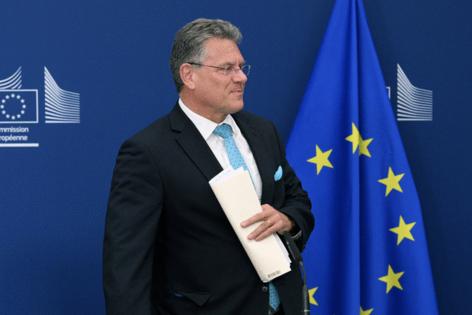EU to accept Trump universal tariff but seeks key exemptions
Published in News & Features
BRUSSELS — The European Union is willing to accept a trade arrangement with the U.S. that includes a 10% universal tariff on many of the bloc’s exports, but wants the U.S. to commit to lower rates on key sectors such as pharmaceuticals, alcohol, semiconductors and commercial aircraft.
The EU is also pushing the U.S. for quotas and exemptions to effectively lower Washington’s 25% tariff on automobiles and car parts as well as its 50% tariff on steel and aluminum, according to people familiar with the matter.
The European Commission, which handles trade matters for the EU, views this arrangement as slightly favoring the U.S. but still something it could agree to, said the people, who spoke on the condition of anonymity.
The EU has until July 9 to clinch a trade arrangement with President Donald Trump before tariffs on nearly all of the bloc’s exports to the U.S. jump to 50%. The U.S. president has imposed tariffs on almost all its trading partners, saying he wanted to bring back domestic manufacturing, needed to pay for a tax-cut extension and stop other countries from taking advantage of the U.S.
A commission spokesperson didn’t immediately reply to a request for comment.
The S&P 500 quickly lost 12 points seconds after the report, before subsequently rebounding. The benchmark was on pace for its best quarter since December 2023.
In 2024, the EU exported €52.8 billion ($62.2 billion) worth of cars and car parts to the U.S., it’s largest export destination, according to data compiled by the EU and analysts at ING Groep NV. The bloc exported €24 billion of steel and aluminum to the U.S., led by Germany, Italy and France, data from the Vienna Institute for International Economic Studies show.
The EU and U.S. are increasingly confident that an interim agreement can be reached by July 9 to allow negotiations to continue beyond the deadline, Bloomberg reported earlier. Any accord would also cover tariff and non-tariff barriers, purchases of key U.S. goods and would outline additional areas for cooperation, according to the people.
The EU’s trade chief, Maros Sefcovic, will lead a delegation to Washington this week to try to move the talks forward, said the people. The bloc continues to believe that an agreement in principle remains the best-case scenario, but officials have been unable to clarify for how long any such interim arrangements would last as negotiations continue.
The commission also wants to make sure that the current sectoral tariffs that the U.S. has in place — such as on cars and metals — as well as future tariffs Washington is planning, are addressed up front, two of the people said.
The EU is looking to address non-tariff barriers mostly through its simplification agenda and has proposed exploring strategic purchases in several areas, such as liquefied natural gas and artificial intelligence technologies. The bloc is also open to working with the U.S. on common economic security challenges.
The EU estimates that U.S. duties now cover €380 billion, or about 70%, of its exports to the U.S.
The commission told member states on Monday that the bloc had received a proposal from the U.S. covering tariffs, non-tariff trade barriers and areas of strategic cooperation, said the people. Specific details on the American offer, such as potential tariff rates, were not shared with member states, the people added.
Officials set out four potential scenarios ahead of next week’s deadline: a deal with an acceptable level of asymmetry; an unbalanced U.S. offer that the EU could not accept; extending the deadline to allow negotiations to continue; or Trump walks away from talks and hikes tariffs, said the people.
The last scenario would most likely see the EU retaliate with all its options, said the people.
In parallel to the negotiations, the bloc continues to prepare countermeasures should the talks yield an unsatisfactory outcome.
The EU has approved tariffs on €21 billion of U.S. goods that can be quickly implemented in response to Trump’s metals levies. They target politically sensitive American states and include products such as soybeans from Louisiana, home to House Speaker Mike Johnson, as well as agricultural products, poultry, and motorcycles.
The bloc has also prepared an additional list of tariffs on €95 billion of American products in response to Trump’s so-called reciprocal levies and automotive duties. They would target industrial goods including Boeing Co. aircraft, U.S.-made cars, and bourbon. The EU is also consulting member states to identify strategic areas where the U.S. relies on the bloc, as well as potential measures that go beyond tariffs such as export controls and restrictions on procurement contracts.
The EU, which has been seeking a mutually beneficial deal, will assess any end result and at that stage decide what level of asymmetry it’s willing to accept, Bloomberg previously reported.
_____
©2025 Bloomberg L.P. Visit bloomberg.com. Distributed by Tribune Content Agency, LLC.







Comments